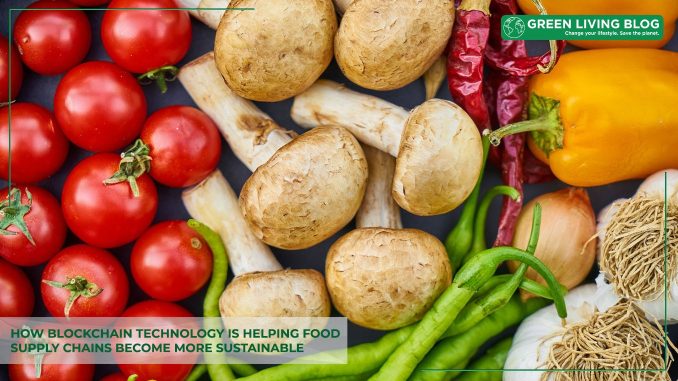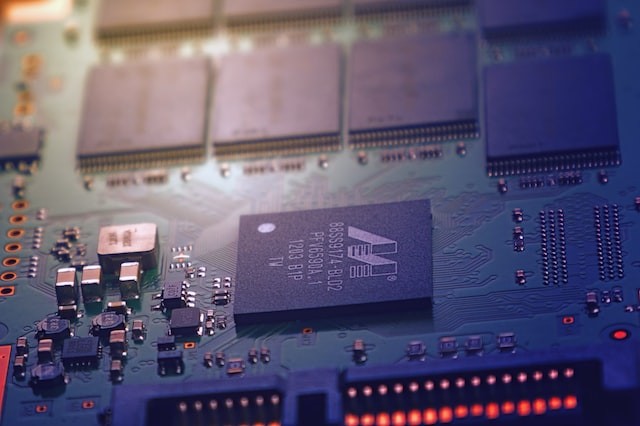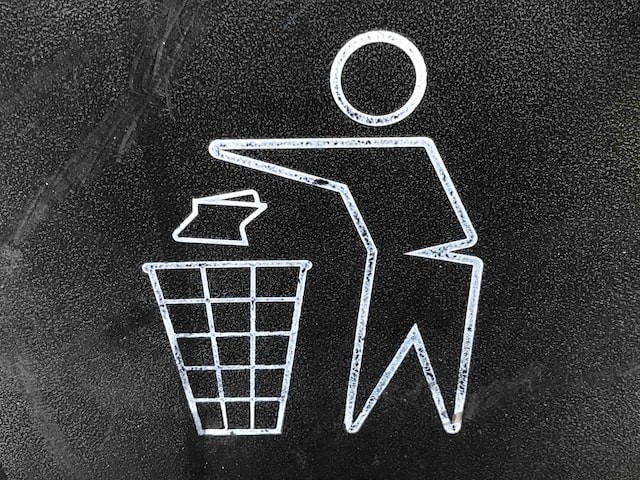
The rise of blockchain technology has opened many doors in recent years, allowing advancements in a multitude of fields, including economics, digital data, and sustainability.
As global food supply networks have grown in complexity and unsustainability, many experts are looking to blockchains for answers on how to improve the environmental efforts of our food suppliers.
This article explains what blockchains are, and how we can use them to reduce the environmental impacts of global food networks.
What Is Blockchain Technology?

Blockchain is a system of recording and transmitting data that is nearly impossible to hack or alter. Businesses and networks can track and trade assets through the immutable ledger of blockchain without the security risks common in traditional transactions. Assets can be both tangible, such as money, products, or services, or intangible, such as copyrights and data.
One of the major benefits of the blockchain is that it increases security in transactions, reducing the risks of fraud, lost or corrupted data, and third-party interference. It also improves the efficiency as all transactions are immediate, and it improves transparency as no transactions can ever be deleted or altered.
While blockchains are highly energy-intensive and currently receive criticism for their environmental impacts, there’s a growing push to improve the sustainability of blockchains to enhance their overall impact on sustainable economic growth.
How Blockchains Improve Food Supply Chains

Food scarcity is a growing concern around the world, with poverty, climate instability, and other socioeconomic factors all contributing to unstable food supply chains. The lack of adequate food distribution has led to a rise in food deserts, even in countries as affluent as the US, where people lack accessible grocery stores and healthy food options, and subsequently face malnutrition, diabetes, and other diet-based health risks.
Efforts in sustainability have led to the rise of regenerative farming practices as a way to combat food insecurity, as well as organic farming practices to reduce the environmental impacts of mass agriculture. However, as populations grow to a predicted 9.8 billion people by 2050, these practices alone may not be enough to feed the planet.
The introduction of blockchain systems to global food supply networks may be a key solution to improving their sustainability and security.
Improving Traceability and Transparency
The vast interconnections that make up global food supply chains result in a major lack of transparency that severely overcomplicates these networks. By implementing blockchain systems in supply chains, suppliers, distributors, and farmers alike have greater access to their supply networks and can easily see where their products are going and where they come from.
A recent case study showed the efficiency of blockchain transparency when Walmart compared the traceability of a single packet of mango slices with blockchain technology to traditional record-keeping. In the study, it took almost one week to trace the fruit’s origins through email, fax, and phone calls, whereas the blockchain system created a comprehensive and accurate record of all its suppliers in 2.2 seconds.
Full transparency and traceability are vital to improving food sustainability as they enable companies to better select their suppliers based on sustainability efforts and ethical practices. This transparency involves every aspect of the supply chain, including farmers, distributors, and even packaging companies. Companies can use blockchain technology to ensure every step of the supply chain abides by ethical and sustainable practices with regular safety inspections, third-party certifications, and chemical testing. It also helps improve efficiency in the event of a recall, where foods can be quickly traced and distributors can keep in contact with their suppliers.
Reducing Carbon Footprints

Blockchain technology can significantly improve the sustainability of food supply chains by increasing their efficiency and transparency, as well as directly reducing their carbon footprints. Agriculture has an immense impact on the global environment, emitting approximately 11% of the world’s greenhouse gasses through livestock, deforestation, and food waste.
Unfortunately, nearly 40% of all food produced goes to waste, primarily in the supply chain. This can be due to a number of causes, including:
- Farmers unable to sell all crops to retailers
- Food going bad during storage and transportation
- Unnecessarily large orders with retailers unable to sell to consumers
Blockchain systems can drastically reduce these issues, with historical data helping retailers accurately predict how much food to purchase, and helping farmers to find other potential retailers in the event of excess production.
These systems can also promote a circular economy by maximizing communication between providers, enabling excess food to be turned into animal feed or fertilizer, thereby minimizing the greenhouse gas emissions from organic waste.
Blockchain technology is a quickly growing field with a vast array of applications. When properly implemented, it may be able to significantly reduce the growing threat of food insecurity around the world. By improving efficiency, sustainability, and transparency, blockchain technology may be the key to a sustainable global food supply chain.
![]()
Author Profile
- Online Media & PR Strategist
- Blogger and Educator by Passion | Senior Online Media & PR Strategist at ClickDo Ltd. | Fascinated to Write Lifestyle Blogs in News & Education I have completed a journalism summer course at the London School of Journalism and manage various blogs.
Latest entries
 Green GuidesMay 29, 202519 Best Eco-Friendly Products, Services & Gifts – With Special Deals
Green GuidesMay 29, 202519 Best Eco-Friendly Products, Services & Gifts – With Special Deals List postMay 28, 202510 Everyday Items with PFAs (‘Forever Chemicals’) and Green Alternatives
List postMay 28, 202510 Everyday Items with PFAs (‘Forever Chemicals’) and Green Alternatives List postMay 22, 20258 Eco-Friendly & Energy-Saving Home Gadgets for Daily Routines
List postMay 22, 20258 Eco-Friendly & Energy-Saving Home Gadgets for Daily Routines Green LivingMay 15, 20258 Healthy BBQ Swaps for a Cleaner, Greener, Guilt-free Grillfest
Green LivingMay 15, 20258 Healthy BBQ Swaps for a Cleaner, Greener, Guilt-free Grillfest






Leave a Reply
You must be logged in to post a comment.